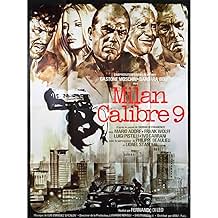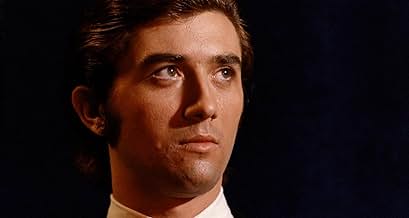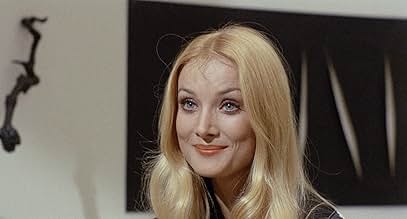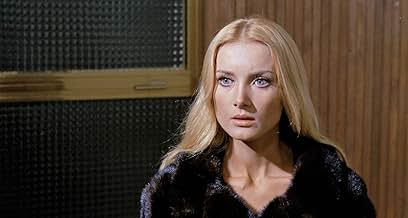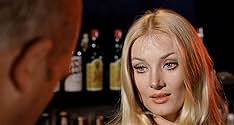Un ex gangster è costretto a riprendere il suo vecchio stile di vita quando i suoi ex colleghi violenti e gelosi e la polizia credono che sappia dove si trova un nascondiglio rubato di trece... Leggi tuttoUn ex gangster è costretto a riprendere il suo vecchio stile di vita quando i suoi ex colleghi violenti e gelosi e la polizia credono che sappia dove si trova un nascondiglio rubato di trecentomila dollari.Un ex gangster è costretto a riprendere il suo vecchio stile di vita quando i suoi ex colleghi violenti e gelosi e la polizia credono che sappia dove si trova un nascondiglio rubato di trecentomila dollari.
- Regia
- Sceneggiatura
- Star
Recensioni in evidenza
Gastone Moschin is very good in the lead as the apparent excon and victim of the Mafia's attention, but the acting prize goes to Mario Adorf's Mafia Lieutenant. He also has the best line, right at the end - which I cannot give away as it would spoil the suspense.
After a heist that saw a wad of money go missing and the criminals behind it either dead or behind bars, shadowy mafia boss The Americano (Lionel Stander) is left fuming, turning his city upside down in search for his cash. Career criminal Ugo (Gastone Moschin), one of the participants in the robbery, is released from prison and is immediately reprimanded by his psychotic former boss Rocco (Mario Adorf), who fingers Ugo as the culprit. Denying any involvement and trying to go straight, Ugo finds himself pulled back into the criminal world he thought he had left behind by the mafia and the police, the latter trying to pressure him into turning informer. Hooking up with his friend Chino (Philippe Leroy) and girlfriend Nelly (the gorgeous Barbara Bouchet), Ugo plans to turn the tables on his former gang while he still has a fraction of leverage.
The film is not without it's problems - occasionally the narrative sags when the action is away from the city's violent underworld, and the sporadic political discussions between the veteran Commissioner (Frank Wolff) and his left-wing underling seem relevant but out of place - but Milano Caliber 9's quality lies within its tone and exhilarating brutality. The opening sees the manic Rocco beat up suspects, tie them together in a cave and blow them up with dynamite. Although the film doesn't maintain the excitement of this early scene, it truly comes alive when the characters - an ensemble of odd-looking barbarians - threaten each other with words, fists, knives or guns. Moschin proves to be a stoic anti-hero, but Adorf steals the show as the arrogant loud-mouth Rocco, resembling Super Mario in a tailored suit and a neater moustache. The twists and turns keep coming right until the end, and left me wanting to see more from a film-maker who has, up to now, completely evaded me.
Resume:
First watch: 2019 / How many: 1 / Source: DVD / Rating: 8.5
Mario Adorf gives a performance that brings to mind Joe Pesce in Goodfellas(1990) and Casino(1995), Takeshi Kitano in Boiling Point(1990), and Lee Marvin in The Big Heat(1953). He is excellent as the mafia hood with a sadistic streak. Mario Adorf plays his character with unbelievable and vicious conviction. His performance is one of the best acting jobs from the film.
This movie along with La Mala Ordina/Hired to Kill(1973) and Il Boss/The Boss(1973) makes Fernando Di Leo the Italian eqivulent of Jean Pierre Melville. Fernando Di Leo is influenced by Melville in many aspects. Milan Calibre 9(1972) reminds me of Le Doulos(1961) with their use of anti heroes. One of many films that Jean Pierre Melville made an impression on.
Has a double plot twist which is utilized in cleaver and unpredictable fashion. I was surprised by the first plot revealing twist. I was convincing stunned by the second plot revealing twist which was much more unexpected. The double plot twist is one characteristic that makes the film special.
Fernando Di Leo stands out in the gangster craze of Italian cinema in the same way that Sergio Leone stood out as a master of Italian Westerns, Dario Argento as a master of Giallos, and Lucio Fulci as a master of Italian Zombie pics. He brings out a direction full of passion and spunk. The director films the violent scenes with panache and piazzazz. An underrated filmmaker in Italian cinema.
Soundtrack of Milan Calibre Nine is awesome and cool. Luis Enriquez Bacalov is excellent at performing music for Italian Crime and Western motion pictures. The Police are depicted in a cynical and unsympathetic light. The only Police officer who comes out in a sympathetic tone is Fonzino who's only in the movie for a few minutes.
The major action sequence in Milan Calibre 9(1972) prefigures John Woo. What's so twisted about the end of the motion picture is its Rocco whose the most trust worthy person in the entire story. Gastone Moschin gives a gripping performance as a man who cannot escape his tragic fate. Some wonderful performances are handed out by Barbara Bouchet, Philippe Leroy, and Lionel Stander.
The scene where Nelly Bordon played by Barbara Bouchet is doing an erotic dance is filmed with multiple camera angles. An sensual introduction to the character of Barbara Bouchet. The editing in this one scene is good and imaginative. Barbara Bouchet is definitely one of the beautiful women from the 1970s when one sees Milan Calibre 9(1972).
An example of the growing popularity of the gangster movie in Italy. Milan Calibre 9(1972) is in my opinion belongs among the top ten of Italian gangster pictures. The Godfather(1972) may have influenced the gangster film in Italy during the 1970s, but Milano Calibro 9(1972) takes on a life of its own. I've was very impressed by Milano Calibro 9(1972) that I've taken an interest in other films from this genre and decade in Italian cinema.
Provided many influences and inspirations for filmography of Quentin Tarantino. His portrayal of tough guys in his films takes a page out of Milan Calibre 9 as well as other mafia features by Fernando Di Leo. The sadistic violence and unpredictable plot twists can be seen in Resevoir Dogs(1992) and Pulp Fiction(1994). No one filmmaker has influenced Tarantino more frequently besides Jean Pierre Melville than Fernando Di Leo.
That doesn't stop Rocco harassing the hell out of him, however. First he's taken to a scrapyard to have the crap beaten out of him, then Rocco and his goons turn up at Ugo crap hotel and destroy the place, but Ugo still denies taking the cash. Ugo goes to his old partner Phillip Leroy for help, but the man can only offer him money and advises him to go see the Mikado (although he does give Rocco a kicking for good measure).
The Mikado, knowing that if Ugo has the money, then there's no point in killing him, hires him as a runner and has him work for Rocco, but things go from bad to worse when a red-clad figure who has been following Ugo kills one of the goons, steals more cash, and sets in motion a series of events that ends in a bloodbath. I suppose this being 1972 they had to throw in a mysterious killer somewhere.
This all sounds like your usual Euro-crime movie, but there also an ongoing socio-political debate between two cops (An animated Frank Wolff and a subdued Luigi Pistilli) about the differences in the rich and the poor, and the North and the South of the country. This is reflected in the Mikado's speech about the old and new mafia, and how honour is not practised by the 'new' criminals, which is something that comes back to haunt the film's bleak ending.
Just about every actor involved here stands out. Phillip Leroy tries to live in peace but his hand is forced by events beyond his control – his weary resignation at what he has to do in the end is a highlight, Gastone Moschin is no oil painting but as the quiet, brooding lead plays a very good burned out criminal, but Mario Adorf blows them all of the screen as the manic 'moustache Pete' who may be violent and cruel, but still knows how to stick to the code of honour. His character is no fool either, as a tense, and mostly silent scene between Ugo and himself in a police station shows.
The soundtrack is a killer too! Although not my favourite Poliziotteschi film (for that is what they are called), it's probably my favourite Fernando De Leo film. Oh! Special mention to the set design of Barbara Bouchet's flat – amazing use of black and white.
This was one of two films released after Frank Wolff's suicide. His co- star here, Luigi Pistilli, would also go on to commit suicide after receiving bad reviews and having a public meltdown (much later, in 1996). On a happy note Phillip Leroy and Mario Adorf still walk the Earth!
Lo sapevi?
- QuizFernando Di Leo admitted that, with a critical eye, the scenes at the Police Station among the "fascist" Commissario and the "communist" Mercuri should be taken off because they take strength out of the main story. But the work of actors Frank Wolff and Luigi Pistilli was so good that he couldn't absolutely cut it off.
- BlooperDuring the brief gun fight, the handgun sound effects do not match the barrel flashes. One flash, 3 gunshots.
- Citazioni
Rocco Musco: [in Italian version]
[last lines, grabbing Luca's hair]
Rocco Musco: You... do not kill a man like Ugo Piazza, TREACHEROUSLY!
Rocco Musco: [slams Luca's head on the edge of the cabinet for the first time] You... shouldn't even touch a man like Ugo Piazza!
Rocco Musco: [slams Luca's head on the edge of the cabinet for the second time] You... should NEVER EVER touch a man like Ugo Piazza!
Rocco Musco: [slams Luca's head on the edge of the cabinet for the third time] You... when you see someone like Ugo Piazza, YOU HAVE TO TIP YOUR HAT!
Rocco Musco: [slams Luca's head repeatedly until he dies and then spits at his corpse] TIP YOUR HAT! TIP YOUR HAT! TIP YOUR HAT! TIP YOUR HAT!
- ConnessioniFeatured in History of the Erotic Cinema (1982)
I più visti
- How long is Caliber 9?Powered by Alexa
Dettagli
- Tempo di esecuzione1 ora 40 minuti
- Colore
- Proporzioni
- 1.85 : 1
Contribuisci a questa pagina


